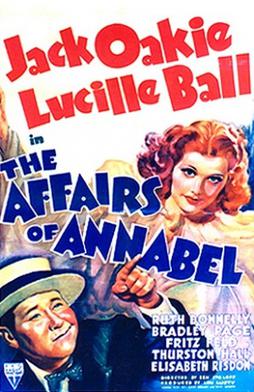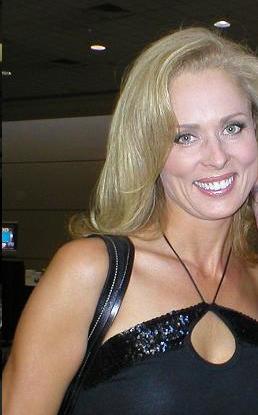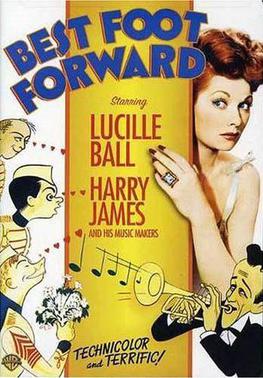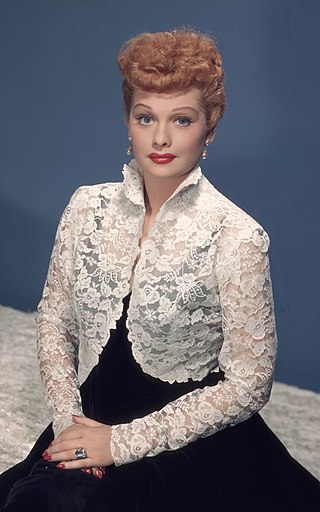
Desiderio Alberto Arnaz y de Acha III, known as Desi Arnaz, was a Cuban-American actor, musician, producer, and bandleader. He played Ricky Ricardo on the American television sitcom I Love Lucy, in which he co-starred with his wife Lucille Ball. Arnaz and Ball are credited as the innovators of the syndicated rerun, which they pioneered with the I Love Lucy series.

Lucie Désirée Arnaz is an American actress and singer. She is the daughter of actors Lucille Ball and Desi Arnaz.

The Affairs of Annabel is a 1938 American comedy film directed by Benjamin Stoloff and starring Lucille Ball, Jack Oakie and Ruth Donnelly. It was produced and distributed by RKO Pictures. The film was followed by the sequel Annabel Takes a Tour the same year, also starring Oakie, Ball and Donnelly.

Show People is a 1928 American synchronized sound comedy film directed by King Vidor. While the film has no audible dialog, it was released with a synchronized musical score with sound effects using both the sound-on-disc and sound-on-film process. The film was a starring vehicle for actress Marion Davies and actor William Haines and included notable cameo appearances by many of the film personalities of the day, including stars Charlie Chaplin, Douglas Fairbanks, William S. Hart and John Gilbert, and writer Elinor Glyn. Vidor also appears in a cameo as himself, as does Davies.

Ewa Laurance is a Swedish professional pool player, most notably on the Women's Professional Billiard Association nine-ball tour, a sports writer, and more recently a sports commentator for ESPN. In 2004, she was inducted into the Billiard Congress of America's Hall of Fame. She has been nicknamed "the Leading Lady of Billiards" and "the Striking Viking".

Leigh Taylor-Young is an American former actress who has appeared on stage, screen, podcast, radio, and television. Her best-known films include I Love You, Alice B. Toklas (1968), The Horsemen (1971), The Gang That Couldn't Shoot Straight (1971), Soylent Green (1973), and Jagged Edge (1985). She won an Emmy for her role on the hit television series Picket Fences.

Hands Across the Table is a 1935 American romantic screwball comedy film directed by Mitchell Leisen and released by Paramount Pictures. It stars Carole Lombard as a manicurist looking for a rich husband and Fred MacMurray as a poor playboy, with Ralph Bellamy as a wealthy ex-pilot in a wheelchair. The teaming of Lombard and MacMurray was so well received, they went on to make three more films together, The Princess Comes Across (1936), Swing High, Swing Low (1937), and True Confession (1937).

Marion Suplee, known professionally as Marion Martin, was an American film and stage actress.

Three Little Pigskins is a 1934 short subject directed by Raymond McCarey and starring American slapstick comedy team The Three Stooges. It is the fourth entry in the series released by Columbia Pictures starring the comedians, who released 190 short films for the studio between 1934 and 1959.

"Lucy Does a TV Commercial" is the 30th episode of the 1950s television sitcom I Love Lucy, airing on May 5, 1952. It is considered to be the most famous episode of the show. In 1997, TV Guide ranked it #2 on their list of the "100 Greatest Episodes of All Time". In 2009, they ranked it #4 on their list of "TV's Top 100 Episodes of All Time." The initial episode was watched by 68% of the television viewing audience at the time.

Best Foot Forward is a 1943 American musical film adapted from the 1941 Broadway musical comedy of the same title. The film was released by Metro-Goldwyn-Mayer, directed by Edward Buzzell, and starred Lucille Ball, William Gaxton, Virginia Weidler, Chill Wills, June Allyson, Gloria DeHaven, and Nancy Walker.

Lucy and Ricky Ricardo, also known simply as Lucy and Ricky or the Ricardos, are fictional characters from the American television sitcom I Love Lucy, portrayed respectively by Lucille Ball and Desi Arnaz. The Ricardos also appear in The Lucy–Desi Comedy Hour, and Lucy also appears in one episode of The Ann Sothern Show.

The Senator Was Indiscreet is a 1947 American comedy film, the only movie directed by playwright, theatrical director/producer, humorist, and drama critic George S. Kaufman. Produced by Universal Pictures it starred William Powell as a dim-witted U.S. senator who decides to run for president, with Ella Raines as a reporter interested in the detailed diary he has kept about all the political misdeeds of his colleagues. Powell won the New York Film Critics Circle Award for Best Actor for his performances in this film and in Life with Father.

Ruth Donnelly was an American film and stage actress.

Lucy is a 2003 television film directed by Glenn Jordan. It is based on the life and career of actress and comedian Lucille Ball. The film premiered on May 4, 2003, on CBS.

Easy Living is a 1949 American drama film directed by Jacques Tourneur, starring Victor Mature, Lucille Ball and Lizabeth Scott. The film features the real-life Los Angeles Rams football team.

Lucille Désirée Ball was an American actress, comedian, producer, and studio executive. She was recognized by Time in 2020 as one of the most influential women of the 20th century for her work in all four of these areas. She was nominated for 13 Primetime Emmy Awards, winning five, and was the recipient of several other accolades, such as the Golden Globe Cecil B. DeMille Award and two stars on the Hollywood Walk of Fame. She earned many honors, including the Women in Film Crystal Award, an induction into the Television Hall of Fame, a Kennedy Center Honor, and the Governors Award from the Academy of Television Arts & Sciences.

A Woman of Distinction is a 1950 American screwball romantic comedy film directed by Edward Buzzell and starring Rosalind Russell, Ray Milland and Edmund Gwenn. It was produced and distributed by Columbia Pictures.

That Girl from Paris is a 1936 American musical comedy film directed by Leigh Jason and starring Lily Pons, Jack Oakie, and Gene Raymond. The film made a profit of $101,000. John O. Aalberg was nominated for an Academy Award in the category Sound Recording.

Lady Luck is a 1936 American comedy film directed by Charles Lamont and starring Patricia Farr, William Bakewell and Duncan Renaldo. It was made by Chesterfield Motion Pictures Corporation.



















